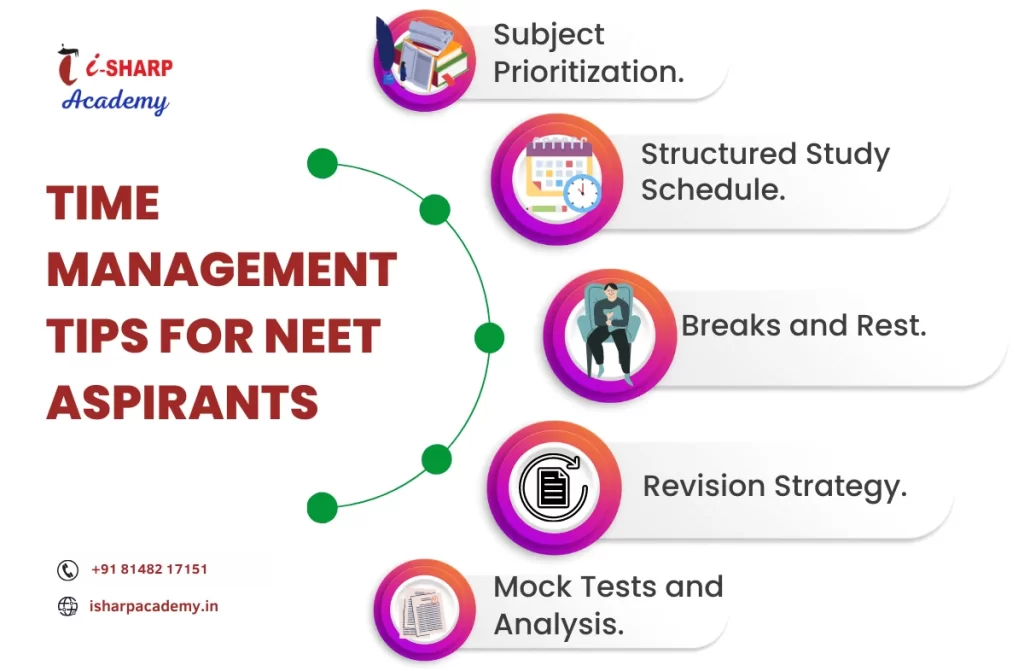The National Eligibility cum Entrance Test (NEET) is the largest medical entrance examination in India. It is a highly competitive exam taken by thousands of aspirants every year, and the competition continues to grow with time. The NEET exam is important as it is the gateway to admission to medical colleges in India. It is recognized by government authorities and is designed to maintain the standard of medical education in India. The best time table for NEET aspirants is essential for NEET aspirants to succeed in the exam.
Marking Scheme
The NEET examination comprises 180 objective-type questions in total. The exam duration is three hours, and the questions are divided into three sections – Physics, Chemistry, and Biology (Botany and Zoology). Negative marking is also applicable in the NEET exam, where one mark is deducted for each incorrect answer, and four marks are awarded for each correct answer.
Importance of NEET Exam
The NEET exam holds great importance for students aspiring to become medical professionals. It is recognized by government authorities, and admission to medical colleges in India is done based on NEET scores. The exam is conducted uniformly across the country, making it a fair and transparent process for all medical aspirants.

Need for a Best Time Table for NEET Aspirants
Aspirants aiming to crack NEET face tough competition, and preparing for the exam requires proper planning and time management. With a vast syllabus to cover, a best time table for NEET aspirants is essential for effective preparation.
The best time table for NEET aspirants helps to divide their time equally among all subjects, prioritize weak areas, and track their progress.
Proper time management is required to cover the vast syllabus and get sufficient time for revision. Regular practice and revision are necessary to retain the learned concepts. A well-designed and the best time table for NEET aspirants can help them to allocate time for these activities.
The best time table for NEET aspirants should also include breaks for relaxation and rejuvenation, as it is crucial to maintain physical and mental health during the exam preparation phase.
Divide Time Equally: Effective Time Management Tips for NEET Aspirants
Preparing for the National Eligibility cum Entrance Test (NEET) can be a daunting task for medical aspirants. The exam is highly competitive and requires thorough preparation, effective time management, and consistent practice. One of the utmost essential factors to take into account is time management, particularly when crafting the best time table for NEET aspirants.
It is essential to divide time equally among all subjects while giving more time to the subjects that one finds challenging.
NEET covers three subjects: Physics, Chemistry, and Biology (Botany and Zoology). It is important to allocate sufficient time for each subject and ensure that there is no neglect of any particular topic or subject. Here are some tips to design the best timetable for NEET aspirants to divide their time equally:
- Set a Realistic Time Table: Design a timetable that is realistic and achievable. Allocate a fixed number of hours for each subject and stick to the plan. Avoid overestimating or underestimating the time required for each topic.
- Prioritise Subjects: Give more time to the subjects that one finds challenging. These subjects require more practice and understanding, and it is important to allocate enough time to cover all topics thoroughly.
- Focus on Weak Areas: Identify weak areas in each subject and give more time to these topics. Strengthening the weak areas can help improve overall performance in the exam.
- Revision and Practice: Allocate enough time for regular revision and practice. Revision is crucial to retain the learned concepts, and regular practice helps in improving accuracy and speed in solving problems.
- Breaks and Relaxation: Take short breaks in between study sessions and allocate time for relaxation and rejuvenation. Breaks help in maintaining focus and preventing burnout during the exam preparation phase.
- Time Management Tools: Use time management tools like timers, study planners, and apps to track time spent on each topic and monitor progress.
Conclusion
In conclusion, the NEET exam is an essential step for aspirants to pursue a career in the medical field. It is crucial to make the best timetable for NEET aspirants to prepare for the exam with a well-designed timetable, as it helps in effective planning, time management, and tracking progress. A well-designed timetable is the key to success for NEET aspirants and can help them achieve their dream of becoming medical professionals.
Also, Read Best NEET Coaching in Coimbatore.






